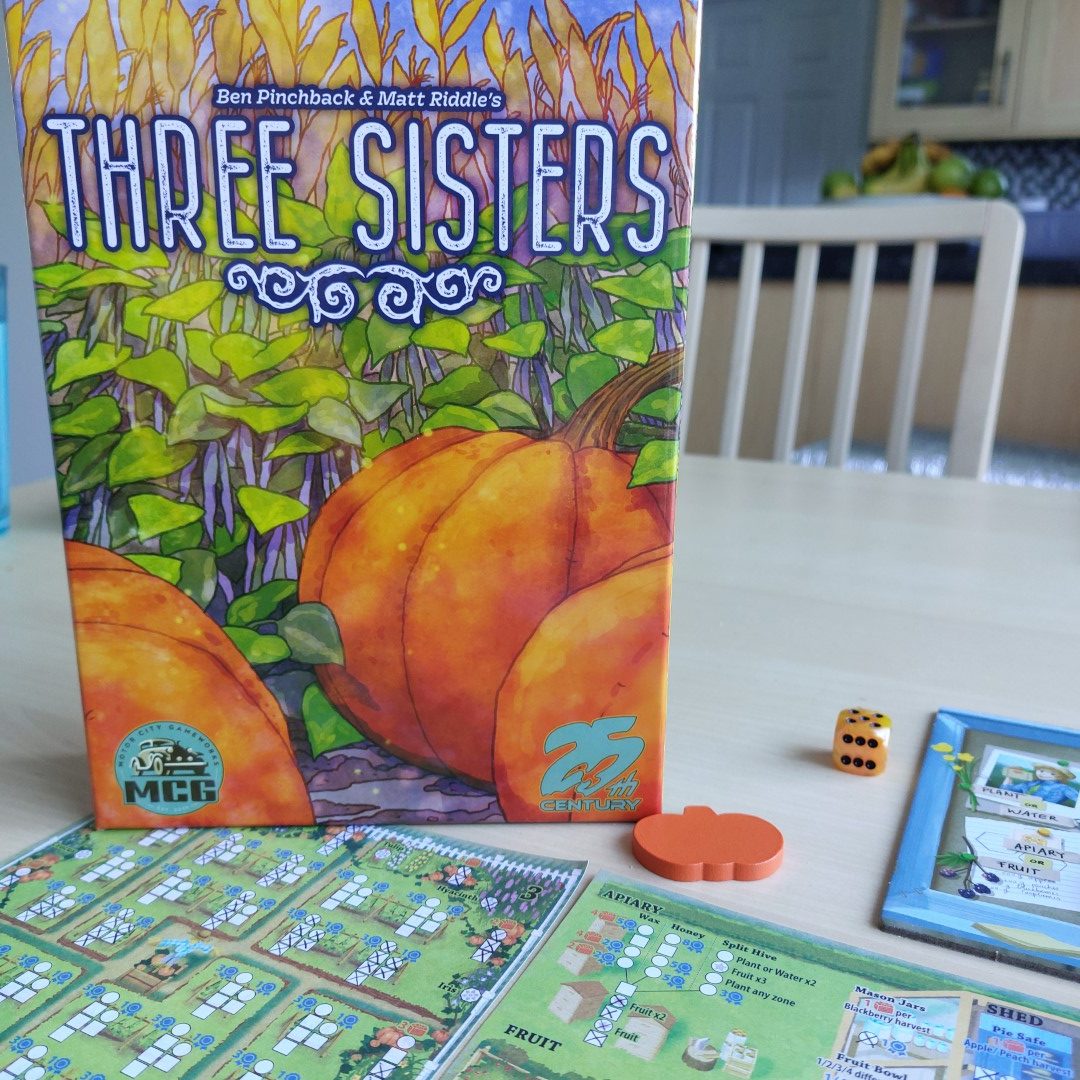Three sisters is a roll and write, rondel game, and that, in essence, is the glue that carries this game to brilliance. That’s the review done!
Some would say Farming is Uwe Rosenberg’s home and that Three Sisters fits into this. Although from a gameplay perspective, it’s not very Uwe! However, theme wise, you’ll be at home on the farm. Maybe a better comparison is That’s pretty clever, a game I recently sold. As I felt so worn out on roll and writes that I couldn’t bring myself to another game of That’s pretty clever. As I was feeling somewhat burned out on the never-ending stream of roll and write games.
However, in three sisters, you’ll find yourself growing three crops, all interlinked to help the other. And there’s a useful about Companion planting in the rulebook, that explains how planting certain crops together is an agricultural practice that is commonly used in the form of Corn, Beans and Squash, with corns providing the stems for beans to grow and squash keeping the ground free from weeds.
So you’ll also find yourself managing your garden, perrinals, shed, apiary, goods and fruit, oh and compost. There’s a lot to manage here, but it’s not overwhelming, or maybe it is slightly at times. But in fact, it’s endearing in how it all ties together, and there’s a sense of needing to achieve everything.
The game takes place over 8 rounds, with the first player rolling the dice, placing them on the associated actions before players, then in turn take a dice and perform a garden action and rondel action.
The garden action allows you to plant crops or water them. And the rondel action allows you to take the action of the space where you took the dice from. This is maybe where my only criticism is. Teaching and grapsing the plant or water rule seems to have stumped several players that I’ve taught the game to. And I wonder if this game would benefit from coloured pens to help make the player boards somewhat less intense or messy, although I’m not sure it’ll help with the plant or water rule! And if you’re feeling brave, you can always play with pens!
Oh, and I haven’t mentioned the events. Each round has an event that generally gives you more stuff, there’s nothing negative in the events all goodness for your farms. Maybe thats unrealistic? But its definitely fun!
And despite its largely ease of teaching and rules, there’s actually a good sprinkling of strategy here, and it feels like there are several ways to win, with each strategy feeling relatively rewarding. However, fundamental to almost every strategy is compost, which is how you mitigate your dice rolls. And without compost, you’ll be left to the dice gods, so you’ll need to ensure you always have some. And I suspect with multiple plays, we’ll make more efficient plays to maximise the bonuses.
At the end of 8 tounds, you’ll score up, and the player with the most points will win. But it’s how each area scores that I want to focus on briefly. Gardens will score as you plant and then grow (through watering) those plants. Perrinals will be worth points if you get to the end of those tracks, while fruit will score depending on how much of each fruit you gather. Whilst the apiary will score depending on how far you’ve developed your apiary and the Shed well that just interlinks with everything else to earn points for the shed tools you use and the other tracks. And that’s what it fundamentally boils down to, track progression. Whoever has built the most combo tastic track successful thing will score the most points, but they’re all seemingly balanced, and its difficult to tell who’s ahead until the final scores. And that keeps me engaged, knowing I’ve had some super combo turns and my opponent has too. Well, the fun part is the combo. The bonus is winning!
What I enjoyed the most was the vast array of different tools within the shed and the interactions of I do this to get this, and it’s got that very satisfying sense of building combos to great turns. Which allows for either that midgame pivot or to hone in and develop your strategy even further. And that’s what makes Three Sisters shine.
As you know, I rate games on a
– Buy or play
– Wait for sale or play if you like game XYZ
– Avoid
For me, this jumps straight in as a “buy or play” three sisters is a game that has me wanting to play more roll and writes all over again.
There’s an essence of strategy here that means every game can be approached differently, and you can pivot mid game. As you watch opponents, you can react, adapt, and compost has this growing sense of importance as you need to work with a reduced selection of dice and you’ll need to manipulate the dice to your liking or if you’re like me and completely forget compost. You’ll be left to try and maximise your turns and bonuses with the dice you are left with. However, as the game progresses, you’ll find yourself building combos that are immensely satisfying. And unlike That’s pretty clever, the theme of Three Sisters feels engaging, and the choice of tools in your shed feels enough to pivot each game and approach each game differently. That ultimately makes me think this is going to be one of my most played games of the year! (But only time with tell)…
Three sisters is available from Kienda.co.uk
Disclaimer: Kienda sent me a copy of Three Sisters to review.

